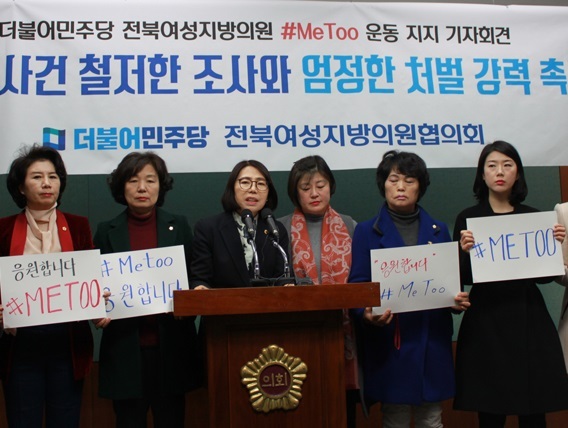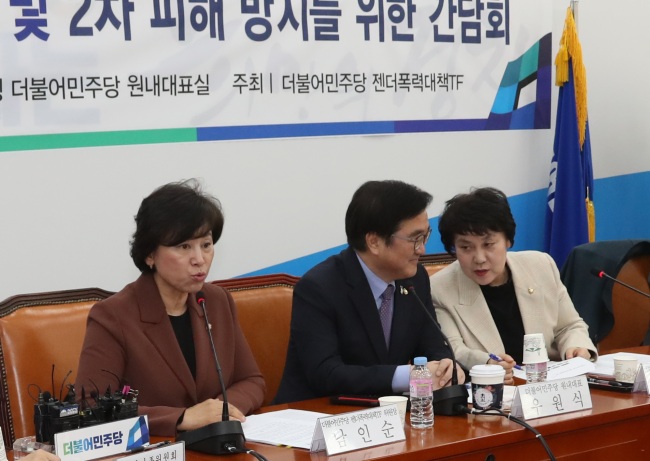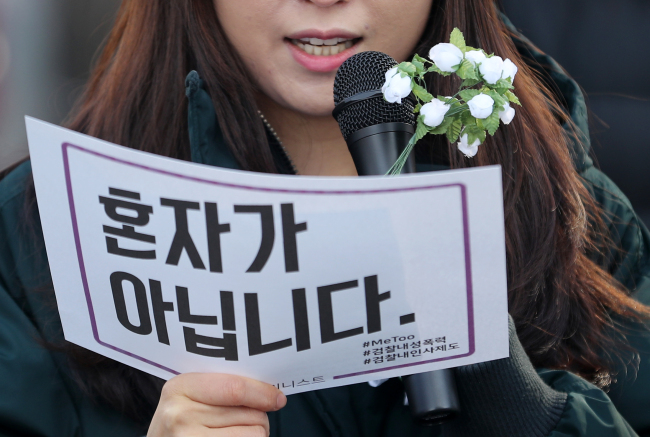[Newsmaker] How #MeToo movement is pushing for revision of South Korea’s defamation law
In the wake of #MeToo movement, truth may soon be acknowledged as defense against defamation charges
Published : 2018-03-01 16:07:20
In the wake of the global #MeToo movement, currently one of the most talked about issues here, South Korea’s controversial defamation law has been also brought into the spotlight.
A number of lawmakers and political parties recently announced that they would push for a revision of the law, which does not acknowledge truth as defense against defamation charges.
Women’s activists and some lawmakers criticized the defamation law as one of the biggest challenges that sexual violence victims here face.

The Korea Herald has gathered some of the main talking points regarding the possible revision, including why it is being discussed and how it will affect those affected by sexual misconduct in future.
Why is the current law a problem?
Truth and fair comment are currently not acknowledged as defense against defamation charges in South Korea.
This means individuals can be criminally punished even for a true statement. For example, a victim of sexual harassment may be punished for publicly speaking against the perpetrator -- even if he or she had been harassed -- if the perpetrator sues or counter-sues the victim for defamation, meaning ruining his or her social reputation.
Many women’s rights activists have been calling for a revision of the law, claiming that it makes it extremely difficult for the victims of sexual violence to speak out or file a legal complaint against the accused.
“The current defamation law very much discourages many victims of sexual violence from filing complaints against the perpetrators, as it is virtually impossible to have a valid defense against a possible defamation suit,” states Korea Women’s Hot Line‘s online guideline for victims of sexual violence.
“Because of this, it’s been pretty easy for those who have been accused to sue their accusers for defamation, thereby putting their alleged victims on the defensive.”
Under the current laws in South Korea, a person who defames another person can face two years behind bars or a fine up to 5 million won ($4,600), even if the information he or she discloses is true.
Article 307 of the Criminal Act specifically states: “A person who defames another by publicly alleging facts shall be punished by imprisonment without prison labor for not more than two years or by a fine not exceeding five million won.”
Earlier this month, an online petition asking the presidential office to revise the defamation law was organized, claiming Article 307 should be abolished. As of Wednesday afternoon, the petition was signed by more than 38,600 Koreans.
Why is the current law a problem?
Truth and fair comment are currently not acknowledged as defense against defamation charges in South Korea.
This means individuals can be criminally punished even for a true statement. For example, a victim of sexual harassment may be punished for publicly speaking against the perpetrator -- even if he or she had been harassed -- if the perpetrator sues or counter-sues the victim for defamation, meaning ruining his or her social reputation.
Many women’s rights activists have been calling for a revision of the law, claiming that it makes it extremely difficult for the victims of sexual violence to speak out or file a legal complaint against the accused.
“The current defamation law very much discourages many victims of sexual violence from filing complaints against the perpetrators, as it is virtually impossible to have a valid defense against a possible defamation suit,” states Korea Women’s Hot Line‘s online guideline for victims of sexual violence.
“Because of this, it’s been pretty easy for those who have been accused to sue their accusers for defamation, thereby putting their alleged victims on the defensive.”
Under the current laws in South Korea, a person who defames another person can face two years behind bars or a fine up to 5 million won ($4,600), even if the information he or she discloses is true.
Article 307 of the Criminal Act specifically states: “A person who defames another by publicly alleging facts shall be punished by imprisonment without prison labor for not more than two years or by a fine not exceeding five million won.”
Earlier this month, an online petition asking the presidential office to revise the defamation law was organized, claiming Article 307 should be abolished. As of Wednesday afternoon, the petition was signed by more than 38,600 Koreans.

Who is calling for revision?
United Nations Human Rights Committee has criticized Korea’s defamation law in the past. The committee was especially concerned about Koreans who were prosecuted for criticizing the government during the Park Geun-hye administration.
A 2015 report by the committee said: “It notes with concern that people can be criminally prosecuted even for making statements that are true. The state party should consider decriminalizing defamation, and should in any case restrict the application of criminal law to the most serious defamation cases, bearing in mind that imprisonment is never an appropriate penalty.”
President Moon Jae-in on Monday expressed his support for the country’s #MeToo movement and called on the judicial agencies and all relevant government bodies to actively investigate allegations of sexual abuse.
“I applaud those who were courageous enough to break the silence and tell their stories,” Moon Jae-in said during a meeting with his advisers. “I actively support the #MeToo movement. We should take this chance, regardless of how painful and embarrassing it can get, to learn our reality and find a concrete solution.”
Some of the high-profile figures accused of sexual misconduct include Lee Yoon-taek, a powerful leader in South Korea’s theater community who has served as the head of the National Theater of Korea. Another is Cho Jae-hyun, a veteran actor who has often collaborated with famed film director Kim Ki-duk.
Director Kim, who has won top prizes at coveted international film festivals, also has been accused of sexual misconduct by one of the actresses he’s worked with in the past.
The ruling Democratic Party, as well as the Party for Democracy and Peace, have announced that they will push for a revision of the defamation law.
While the ruling party said it aims to decriminalize defamation, the Party for Democracy and Peace said it hopes to see Article 307 of the Criminal Act abolished.
The ruling party’s Rep. Nam In-soon, a feminist activist-turned-legislator, and Rep. Keum Tae-sup, a former prosecutor are among the legislators calling for the law’s revision.
What changes will the revision bring?
If defamation is decriminalized, no one will have to serve jail terms for defaming others.
If Article 307 is abolished but defamation remains a criminal offence, alleged victims of sexual misconduct will have to prove the truth of their statements should they be counter-sued for defamation by the accused. Should the person fail to provide proof, he or she may face imprisonment.
Experts say even if truth is acknowledged as defense against defamation charges, satisfying the legal standard of proof of truth may not be easy for victims of sexual violence.
“There are rarely witnesses to a sexual assault, meaning it is usually one person’s word against another’s, the victim is often in a vulnerable state by virtue of age or other power imbalances, and the trauma of the events can contribute to incomplete or vague memories of what happened,” writes Elizabeth Grace, a lawyer at Canada-based Lerners Personal Injury Group, a personal injury law firm.
In Canada, truth is accepted as defense against defamation charges.
“The effect of factors like these, especially combined, can be sufficient to defeat the defense of ‘truth’ to a defamation claim.”
Indeed, news reports have pointed out that many alleged victims of sexual violence in Korea would not press charges against their alleged abuser, and those who have done so find their trials extremely distressing.

At trial, victims are asked to revisit the incident and questions by the accused‘s lawyer can be hostile and humiliating, often forcing the plaintiff to share her or his sexual history and even preferences.
Some frequently asked questions include, “Why didn’t you resist?” or “Why did you drink alone with the defendants in the first place?”
Not everyone in Korea thinks Article 307 should be abolished.
Some say once the defamation law is revised, it might violate Article 17 of the Constitution, which states: “The right to privacy of all citizens shall not be infringed.”
“People should have the right to have their personal history protected, regardless of them being true or not,” said Kim Han-jun, a professional in Seoul who is skeptical about the possible revision.
“The revision of the current law might allow anyone to disclose any information about others’ past or private lives, even if you are not a public figure with a lot of influence on the general public and interest.”
By Claire Lee (dyc@heraldcorp.com)
http://www.koreaherald.com/common/newsprint.php?ud=20180301000196